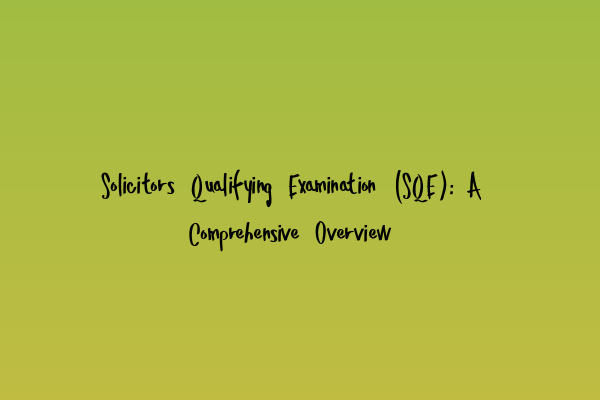Solicitors Qualifying Examination (SQE): A Comprehensive Overview
Welcome to our comprehensive guide on the Solicitors Qualifying Examination (SQE)! Whether you’re a law student or a seasoned professional looking to become a solicitor, this post aims to provide you with a detailed overview of the SQE, its structure, and how to prepare effectively for the exam. So, let’s dive in!
What is the SQE?
The Solicitors Qualifying Examination, or SQE, is a new assessment that will replace the existing route to qualifying as a solicitor in England and Wales from September 2021. It is designed to standardize the qualification process and ensure that all prospective solicitors are assessed on the same set of competencies.
Structure of the SQE:
The SQE is divided into two stages: SQE1 and SQE2. Let’s take a closer look at each of these stages:
1. SQE1:
SQE1 is an online, computer-based assessment that tests candidates on their fundamental legal knowledge and understanding. It consists of two parts:
a) Functional Legal Knowledge: This part covers areas such as Constitutional and Administrative Law, Contract Law, Criminal Law, Property Law, and Tort Law. It assesses candidates’ understanding of key legal principles and their ability to apply them in practical scenarios.
b) Practical Legal Skills: This part evaluates candidates’ ability to apply legal knowledge in practical contexts. It includes tasks such as legal research, legal writing, and drafting.
2. SQE2:
SQE2 is a practical, skills-based assessment that tests candidates on their ability to apply legal knowledge in a realistic work-related context. It focuses on skills such as client interviewing, advocacy, case analysis, and legal research. SQE2 also includes two separate assessments:
a) Legal Research: This assessment requires candidates to demonstrate their ability to research and analyze legal issues effectively.
b) Oral Advocacy: In this assessment, candidates are required to present legal arguments and communicate effectively in a mock courtroom setting.
Preparing for the SQE:
Now that we understand the structure of the SQE, let’s discuss how to prepare for each stage effectively:
1. SQE1 Preparation:
To prepare for SQE1, it is crucial to develop a strong foundation of legal knowledge. Reviewing core subjects such as Constitutional and Administrative Law, Contract Law, Criminal Law, Property Law, and Tort Law is essential. Practice answering sample questions and engage in online mock assessments to familiarize yourself with the computer-based format.
2. SQE2 Preparation:
SQE2 requires focused preparation on practical legal skills. Engage in simulated exercises and mock assessments to improve your client interviewing, advocacy, case analysis, and legal research skills. Consider enrolling in preparation courses or workshops designed specifically for SQE2 candidates.
In addition to these stage-specific preparations, it is important to develop a study plan, set realistic goals, and utilize available resources such as study materials, textbooks, online forums, and sample questions.
Benefits and Future Prospects:
The introduction of the SQE brings several benefits to aspiring solicitors. It offers a more standardized approach to qualification, ensuring a level playing field for candidates. Moreover, the SQE opens up new opportunities for international law graduates and allows them to qualify as solicitors in England and Wales.
The SQE also aims to enhance the professional development of solicitors throughout their career. It provides a foundation of core legal competencies that can be built upon, allowing solicitors to specialize in specific areas of law.
Conclusion:
The Solicitors Qualifying Examination (SQE) is an exciting development in the legal profession, aiming to create a robust and standardized qualification process for solicitors. By understanding the structure of the SQE and preparing effectively for each stage, you can maximize your chances of success.
Remember to develop a study plan, engage in practical exercises, and utilize available resources to enhance your understanding of legal principles and practical skills. Good luck on your journey to becoming a qualified solicitor!
For more information about the SQE and related updates, please visit our website [Website URL] or contact us at [Contact Details].

Leave a Reply